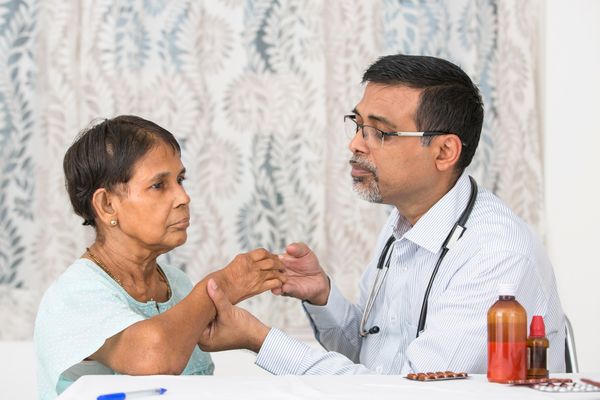July is Graves’ Disease Awareness Month.
Graves’ disease is an autoimmune condition that mainly affects your thyroid. Prompt diagnosis and treatment is important because, without treatment, the disease can lead to serious health problems such as heart failure and osteoporosis. This is especially important to note because women and people assigned female at birth are at higher risk for Graves’ disease as well as heart failure and osteoporosis.
People with Graves’ disease can experience a wide range of symptoms, but some of the most recognizable signs are swelling in the neck around the thyroid area and bulging eyes.
If you or someone you know has — or may have — Graves’ disease, here’s what you need to know about this complex health condition.
What is Graves’ disease?
Graves’ disease is a condition where the immune system creates antibodies called thyroid stimulating immunoglobulin (TSI) that stimulate the thyroid and cause it to make more thyroid hormones than you need. The excess thyroid hormones speed up metabolism and can cause serious physical and mental health issues, such as irregular heartbeat and anxiety.
In the U.S., Graves’ disease is the most common cause of overactive thyroid, also called hyperthyroidism. In fact, about 4 out of 5 cases of hyperthyroidism are caused by Graves’ disease.
What causes Graves' disease?
Research is ongoing as to the exact cause of Graves’ disease. But researchers think a combination of genetics and environmental factors, such as a virus or stress, may trigger the immune system to overstimulate the thyroid gland.
What are the risk factors for Graves’ disease?
Although the cause of Graves’ disease is unknown, there are risk factors that can make you more likely to develop the disease.
Risk factors for Graves’ disease include:
- Being female
- Being over age of 20
- A family history of Graves’ disease
- A family history of Hashimoto’s disease
- Having other immune disorders including Type 1 diabetes, rheumatoid arthritis and vitiligo
- A history of smoking
What are the symptoms of Graves’ disease?
The symptoms of Graves’ disease can vary from person to person and may come and go over time.
Symptoms of Graves’ disease include:
- Rapid heartbeat
- Fatigue
- Intolerance to heat
- Increased sweating
- Rapid weight loss
- Swollen thyroid gland (goiter)
- Increased appetite
- Menstrual cycle changes
- Anxiety
- Muscle weakness
- Problems sleeping
- Shaky hands
- Frequent bowel movements
It’s also common for people with Graves’ disease to develop an associated eye disease. More than 1 in 3 people develop the eye disease called thyroid eye disease (TED).
Symptoms of thyroid eye disease can include:
- Bulging eyes
- Grainy, irritated or itchy eyes
- Sensitivity to light
- Decreased and/or double vision
Is it safe to get pregnant if you have Graves’ disease?
It is possible for people with Graves’ disease to have healthy pregnancies as long as the condition is well controlled.
Thyroid hormone levels that are too high may cause complications for the person carrying the baby as well as the unborn child. Premature birth, low birthweight, preeclampsia and miscarriage have all been linked to high levels of thyroid hormone.
Pregnant people with Graves’ disease are also at higher risk for experiencing a severe increase in symptoms called thyroid storm, which is rare but can be life-threatening.
There is a possibility that high levels of the TSI antibodies can cause overactive thyroid in the fetus — but it’s rare. So, it’s important to test for antibodies and thyroid hormone levels before getting pregnant. And talk to your healthcare provider about your current and past treatments for Graves’ disease because some medications may increase the risk for birth defects.
Treatment options for Graves’ disease
There is no cure for Graves’ disease, but there are treatment options that can help you manage the condition. Antithyroid medications, for example, stop the gland from producing thyroid hormones to help regulate levels.
Beta-blockers, on the other hand, don’t stop the thyroid from making hormones, but can be helpful for treating Graves’ disease symptoms such as rapid heartbeat, tremors and anxiety.
Radioactive iodine therapy — an oral medication that gradually destroys the thyroid cells that make thyroid hormones — is an option but it’s not as commonly prescribed as antithyroid drugs.
People with Graves’ disease may also consider a thyroidectomy — surgery to remove the thyroid.
Clinical trials and Graves’ disease
Unfortunately, there’s been little advancement in treatment options for Graves’ disease over the past 75 years despite the fact that many people can’t tolerate the side effects of their current treatment — and that the available medications just don’t work for some people.
The lack of innovation is why clinical trials are so important. Currently, there are several potential new treatments being studied for Graves’ disease, including oral small molecule, monoclonal antibody and peptide immunomodulation options that can block or reduce the antibodies that cause hyperthyroidism in Graves’ disease.
Still, there’s a lot of research that needs to be done regarding treatments and finding a cure for Graves’ disease. If you’re living with Graves’ disease, talk to your healthcare provider about clinical trials and whether joining a clinical trial is an option for you. You can find more information about active Graves’ disease clinical trials at clinicaltrials.gov.
Graves’ disease can have serious complications. More research means more information to help find a cure.
Resources
This educational resource was created with support from Immunovant, a HealthyWomen Corporate Advisory Council member.







